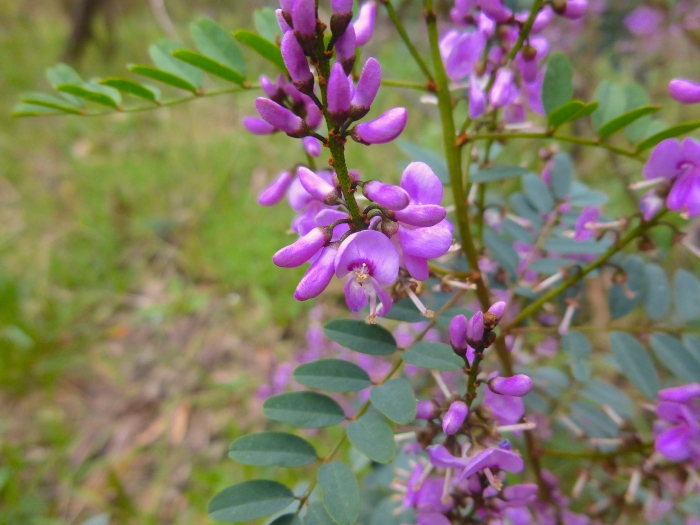Australian Indigo
(Indigofera australis)
Australian Indigo (Indigofera australis)
/
/

Kiri Bee
CC BY 4.0
Image By:
Kiri Bee
Recorded By:
Copyright:
CC BY 4.0
Copyright Notice:
Photo by: Kiri Bee | License Type: CC BY 4.0 | License URL: http://creativecommons.org/licenses/by/4.0/ | Rights Holder: Kiri Bee | Publisher: iNaturalist | Date Created: 2020-10-07T00:48:40-07:00 |



























































Estimated Native Range
Summary
Indigofera australis, commonly known as Australian Indigo, is an evergreen shrub native to a variety of habitats in Australia, including open woodlands, forest edges, and coastal scrublands. It typically grows to a height of 2 meters (7 feet) with an upright habit and flexible stems. The foliage is comprised of pinnate leaves that add a fine texture to garden settings. Australian Indigo produces soft purple to pinkish flowers from mid-September to November, which are particularly showy and provide a contrast to other species flowering at the same time. The flowers are followed by small, elongated seed pods that add further interest to the plant’s appearance.
Australian Indigo is valued for its attractive flowers and adaptability, making it a versatile choice for ornamental use in a variety of garden settings, including urban planting, border planting, and as a specimen shrub. It is also used for revegetation projects due to its ability to regrow and sucker from rootstocks and lateral roots after disturbances such as fire. This shrub thrives in full sun but can tolerate part shade, and it is adaptable to a range of soil types, provided they have good drainage. While it requires medium amounts of water, it can withstand periods of drought once established. Gardeners should be aware that in some conditions, it may spread via suckering, which can be managed with regular maintenance.CC BY-SA 4.0
Australian Indigo is valued for its attractive flowers and adaptability, making it a versatile choice for ornamental use in a variety of garden settings, including urban planting, border planting, and as a specimen shrub. It is also used for revegetation projects due to its ability to regrow and sucker from rootstocks and lateral roots after disturbances such as fire. This shrub thrives in full sun but can tolerate part shade, and it is adaptable to a range of soil types, provided they have good drainage. While it requires medium amounts of water, it can withstand periods of drought once established. Gardeners should be aware that in some conditions, it may spread via suckering, which can be managed with regular maintenance.CC BY-SA 4.0
Plant Description
- Plant Type: Shrub
- Height: 5-6 feet
- Width: 7-9 feet
- Growth Rate: Moderate
- Flower Color: Pink, Purple
- Flowering Season: Spring
- Leaf Retention: Evergreen
Growth Requirements
- Sun: Full Sun, Part Shade
- Water: Medium
- Drainage: Slow, Medium, Fast
Common Uses
Bee Garden, Butterfly Garden, Low Maintenance, Showy Flowers, Street Planting
Natural Habitat
Native to open woodlands, forest edges, and coastal scrublands in Australia
Other Names
Common Names: Austral Indigo, Australischer Indigostrauch
Scientific Names: , Indigofera australis, Indigofera sylvatica, Anil australis, Anila australis, Indigofera lindleyana,
GBIF Accepted Name: Indigofera australis Willd.